
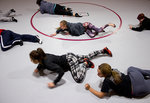


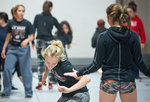


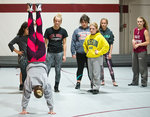
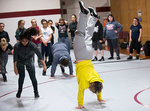
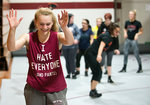

The idea of having a girls wrestling squad, separate from the boys roster, has gradually become more and more of a reality in high schools. Today, the idea has become commonplace, with local schools like Centralia bringing girls programs to prominence with state tournament contenders.
This season W.F. West joined those ranks, with 20 girls turning out to be a part of the first Bearcat girls wrestling team.
The squad is coached by Tony Arredondo, a man with wrestling in his blood. Arredondo was one of the founders of the Twin City Wrestling Club — an institution formed in 1977 where all comers, age 4 to 18, could participate and learn from supervisors and their peers. The seasoned coach has seen several decades of wrestling and has witnessed the progression of women’s wrestling as it has evolved to what it is now.
“With the trend of USA wrestling, girls wrestling has become a big part of it now,” Arredondo said. “We recently went to a tournament in Kelso and there were 400 girls. I was overwhelmed seeing that many. It’s only going to get bigger.”
Joining Arredondo on the coaching staff is George Dodd, a man that Arredondo remembers coaching as a 9-year-old in the same mezzanine of W.F. West High School that the girls practice in today.
“Yeah, me and Tony have come full circle,” Dodd said. “We’ve always kept in contact over the years, and when I got this offer to come coach I thought it would be a great opportunity to help him out.”
Dodd has never been a stranger to a wrestling mat, still grappling to this day. He has spent 20 years as a wrestling official and has been part of the the WIAA Wrestling Officials Association for the last decade. Dodd’s daughter, Alexis, is currently on the roster.
What is now 20 wrestlers stated two last season with just two: 130-pounder Cassandra Shipman and 125-pounder Kayla Weed. Practicing with the boys at the time, Shipman made her way into the state tournament while Weed was a state alternate.
Before Arredondo had even been approached for the coaching position, the team had already been formed and committed, with Shipman and Weed to thank. The two girls were instrumental in the establishment of the team, recruiting 18 others to join the roster for the inaugural season. Weed noted a relationship between herself and other female competitors across schools — a culture that she wanted to recreate with a team of her own.
“We’re all really close and supportive,” Weed said of her friendships with wrestlers from other schools. “We’re all going for the same cause, no matter what the school, and that’s winning.”
Of the 20 girls, only three had prior wrestling experience, but the majority were already involved in other athletics. Many saw wrestling as a chance to reach and maintain proper conditioning for whatever other sports they may be involved in.
“I think that as girls see the opportunities that are available to them and look at wrestling as an opportunity not a disadvantage to them, they’re going to use that to an advantage for other sports,” Dodd said. “We have a lot of girls that are involved in other sports and they’re using this as a catalyst as well.”
The program didn’t come to be without a certain amount of skepticism. Arredondo and Dodd credited the administration for their support, but said there was early skepticism about how long the roster would stay robust. Now outfitted with brand new uniforms and equipment, the Lady Bearcats team has proven doubters wrong thus far since its inception.
“We had someone say that there were only going to be three or four girls still here after four weeks,” Dodd said. “Here we are about three weeks away from postseason and we still have 18 wrestlers. That’s a testament to them and the administration for supporting the program.”
In a document describing the outlook of this season’s squad, Arredondo predicted a solid postseason run for the girls. He also stated that from the very first practice, the girls “have shown that they are very competitive and eager to learn.”
Not only does the program promote yet one more positive outlet and conditioning for other sports, it also has translated well to the classroom and an overall better attitude in the girls.
“The teachers have even come up to us and said they notice a difference in the girls,” Arredondo said. “What it does is it builds self-esteem. There are a lot of things these girls can do that they never really knew they could. It teaches them there isn’t anything they can’t do with the right mindset.”